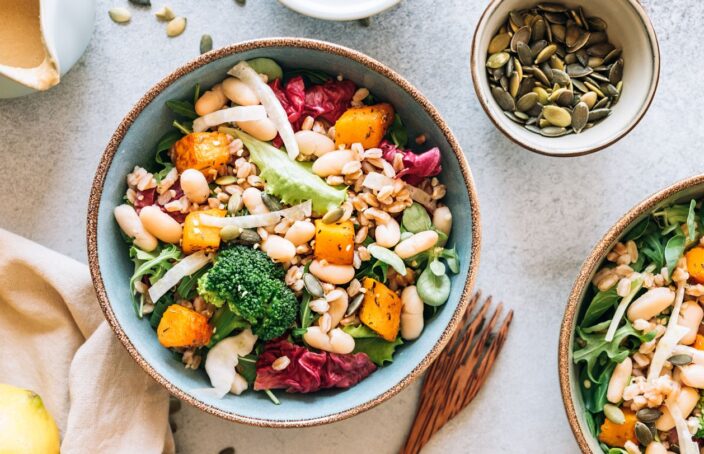How to Reset Your Gut Microbiome: 16 Signs, 14 Tips, and 11 Foods
A few years ago, I was struggling with a frustrating mix of symptoms: constant bloating, unpredictable energy levels, and a rollercoaster of moods. My doctor suggested it could be related to my gut microbiome. I’ll admit, I had no idea what that meant at the time. How could something as tiny as bacteria have such a big impact on how I felt every day?
Turns out, our gut microbiome—the trillions of bacteria, fungi, and other microorganisms living in our digestive system—is like the command center for our health. When it’s balanced and thriving, you feel unstoppable. But when it’s out of whack? Everything from your digestion to your immune system to your mental health can take a hit.
In this article, we’ll explore 16 signs your gut might need a reset, 14 actionable tips to bring it back into balance, and 11 gut-loving foods you’ll want to stock up on ASAP. Let’s dive in.
16 Signs Your Gut Microbiome Needs a Reset
Your body has ways of telling you when your gut isn’t happy. Here are some common signs that your microbiome might be out of balance:
- Frequent bloating or gas: Your digestion feels sluggish or uncomfortable.
- Chronic fatigue: You’re tired even after a full night’s sleep.
- Mood swings or anxiety: Your gut produces serotonin, a key mood-regulating hormone.
- Unexplained weight changes: Gaining or losing weight without trying.
- Food sensitivities: Suddenly reacting to foods that never bothered you before.
- Sugar cravings: An imbalance can lead to overgrowths like candida, which thrives on sugar.
- Skin issues: Acne, eczema, or rosacea flare-ups.
- Frequent colds: A weakened immune system starts in the gut.
- Constipation or diarrhea: Irregular bowel movements can signal trouble.
- Brain fog: Difficulty focusing or feeling mentally “off.”
- Bad breath: Poor digestion can lead to a sour or metallic taste in your mouth.
- Joint pain: Gut inflammation can spill over into your joints.
- Sleep disturbances: Your gut influences melatonin production, which affects sleep.
- Poor stress response: Feeling overwhelmed more easily than usual.
- Cravings for junk food: An imbalanced gut often feeds off processed foods.
- Feeling “off” without a clear reason: Sometimes it’s hard to pinpoint, but you know something’s wrong.
Personal Experience:
When my gut was out of balance, bloating became my constant companion. After almost every meal, I felt like I’d swallowed a balloon. Pair that with low energy and frequent breakouts, and it became clear that my gut needed attention.
14 Tips to Reset Your Gut Microbiome
The good news? Your gut is incredibly resilient. By making small, consistent changes, you can restore balance and feel like yourself again.
1. Cut Back on Processed Foods
Processed foods are like junk mail for your gut—unnecessary and overwhelming. They disrupt your microbiome by feeding harmful bacteria.
How to Start: Swap chips and cookies for whole foods like fruits, nuts, or veggies.
Personal Experience:
Once I cut out ultra-processed snacks, my bloating started to improve within a week. It was like my gut breathed a sigh of relief.
2. Prioritize Fiber
Fiber is the fuel your gut bacteria thrive on. Soluble fiber helps good bacteria flourish, while insoluble fiber keeps digestion moving.
Top Sources: Oats, lentils, chia seeds, and leafy greens.
Personal Experience:
Adding a tablespoon of chia seeds to my morning smoothie worked wonders for my digestion. It became my daily “gut reset.”
3. Stay Hydrated
Water is essential for keeping things flowing. Dehydration can slow down digestion and leave your gut struggling.
Tip: Aim for at least 8 glasses of water daily.
4. Limit Added Sugars
Excess sugar feeds harmful bacteria and yeast, tipping your microbiome out of balance.
How to Start: Check labels and reduce sugary drinks, snacks, and sauces.
Personal Experience:
After cutting out soda, I noticed fewer sugar cravings—and my energy levels stopped crashing midday.
5. Incorporate Fermented Foods
Fermented foods are like probiotics on a plate. They introduce beneficial bacteria to your gut.
Top Picks: Yogurt, kimchi, sauerkraut, kefir, and miso.
Personal Experience:
I added kimchi to my meals and noticed a significant reduction in bloating within two weeks. Plus, it’s delicious!
6. Manage Stress
Chronic stress disrupts your gut-brain axis, leading to inflammation and imbalance.
How to Start: Try meditation, journaling, or yoga to keep stress in check.
Personal Experience:
A 10-minute meditation app helped me stay grounded, and I could feel the difference in my digestion almost immediately.
7. Move Your Body
Exercise boosts blood flow to your gut and promotes healthy digestion.
Tip: Opt for moderate activities like walking, yoga, or swimming.
8. Avoid Overuse of Antibiotics
While sometimes necessary, antibiotics can wipe out beneficial bacteria alongside harmful ones.
How to Protect Your Gut:**
If antibiotics are unavoidable, pair them with probiotics and a fiber-rich diet to replenish your gut flora.
Personal Experience:
After a round of antibiotics for a sinus infection, I doubled down on probiotics and fermented foods. It made a huge difference in preventing bloating and getting my digestion back on track.
9. Get Enough Sleep
Sleep isn’t just for your brain—it’s crucial for your gut health too. Poor sleep disrupts the gut microbiome, making it harder for your body to recover.
Tip: Aim for 7–9 hours of quality sleep each night and maintain a consistent bedtime.
Personal Experience:
When I started prioritizing sleep, my energy improved, and I noticed fewer digestive issues, especially on stressful days.
10. Eat Slowly and Mindfully
Chewing your food thoroughly gives your gut a head start on digestion and reduces the risk of bloating or discomfort.
How to Start: Take smaller bites, chew thoroughly, and savor your meals without distractions.
Personal Experience:
Slowing down while eating helped me avoid the bloating I used to experience after rushed lunches. It’s a small habit that has a big payoff.
11. Incorporate Prebiotics
Prebiotics are like fertilizer for your gut—they feed the good bacteria, helping them thrive.
Top Sources: Garlic, onions, asparagus, and bananas.
Personal Experience:
I started adding sautéed garlic and onions to my meals, and not only did they taste amazing, but my gut seemed to love the extra support.
12. Avoid Artificial Sweeteners
Sweeteners like aspartame and sucralose can disrupt the balance of your gut bacteria.
How to Start: Choose natural sweeteners like honey, maple syrup, or stevia in moderation.
Personal Experience:
After swapping out sugar-free gum for mint tea, I noticed a calmer and happier gut within days.
13. Experiment with Probiotic Supplements
While whole foods are ideal, a high-quality probiotic supplement can fill gaps and provide extra support.
Tip: Look for one with multiple strains and a high CFU count.
Personal Experience:
When I started taking a probiotic, I chose one with Lactobacillus and Bifidobacterium strains. My bloating reduced noticeably after a few weeks.
14. Reduce Alcohol Intake
Alcohol can disrupt the gut barrier and harm beneficial bacteria.
Tip: Limit yourself to 1–2 drinks per week, or opt for alcohol-free options.
Personal Experience:
Cutting back on wine during the week gave my gut a noticeable boost—I felt lighter and more energized.
11 Foods to Reset Your Gut Microbiome
Now that you know the tips, let’s focus on the superfoods that can actively restore and support your gut health.
1. Greek Yogurt
Rich in probiotics, Greek yogurt replenishes good bacteria in your gut.
Tip: Opt for unsweetened versions to avoid added sugars.
Personal Experience:
A bowl of Greek yogurt with berries became my go-to snack. It helped me feel full and supported my digestion.
2. Kimchi and Sauerkraut
These fermented vegetables are probiotic powerhouses that also add a tangy kick to your meals.
Tip: Start with small servings to let your gut adjust.
Personal Experience:
Adding a spoonful of kimchi to my rice dishes not only spiced things up but also reduced my post-meal bloating.
3. Bananas
Bananas are high in prebiotics, which feed beneficial gut bacteria.
Personal Experience:
I found bananas to be a gentle and effective way to calm my stomach during stressful weeks.
4. Garlic
Raw garlic is a prebiotic superstar that feeds the good bacteria in your gut.
Tip: Add it to dressings, marinades, or sautéed dishes.
Personal Experience:
Incorporating garlic into my stir-fries became a delicious way to support my microbiome.
5. Leafy Greens
Spinach, kale, and arugula provide essential fiber and nutrients for gut health.
Personal Experience:
I started having a green smoothie every morning, and my energy and digestion noticeably improved.
6. Oats
Oats are rich in soluble fiber, which promotes healthy digestion.
Tip: Make overnight oats for a gut-friendly breakfast.
Personal Experience:
Switching to oatmeal instead of sugary cereals kept me fuller longer and reduced bloating.
7. Berries
Blueberries, raspberries, and blackberries are full of fiber and antioxidants that promote gut health.
Personal Experience:
Adding a handful of berries to my yogurt or oatmeal became a daily ritual that supported my digestion and satisfied my sweet tooth.
8. Chia Seeds
Chia seeds expand when soaked, helping with hydration and bowel regularity.
Personal Experience:
I mixed chia seeds into my smoothies, and they helped keep everything moving smoothly.
9. Salmon
Rich in omega-3s, salmon reduces gut inflammation and supports a healthy microbiome.
Personal Experience:
Including salmon in my meals once a week made me feel lighter and reduced bloating significantly.
10. Coconut Water
Hydration is key for gut health, and coconut water provides electrolytes that support digestion.
Personal Experience:
Replacing sugary sports drinks with coconut water gave me a gentle energy boost and kept my gut happy.
11. Dark Chocolate (in Moderation)
Dark chocolate contains polyphenols, which act as prebiotics and support gut bacteria.
Personal Experience:
Treating myself to a small piece of dark chocolate in the evening became a guilt-free way to care for my gut and my sweet tooth.
A Happy Gut is a Happy You
Resetting your gut microbiome doesn’t have to be overwhelming. By recognizing the signs of imbalance, implementing small but consistent changes, and incorporating gut-friendly foods into your diet, you can transform your digestion, energy, and overall well-being.
For me, learning to listen to my body and care for my gut was life-changing. No more mystery bloating, no more energy crashes—just a lighter, healthier version of myself.
So, whether you’re just starting your gut health journey or looking to fine-tune your routine, remember: a happy gut is the foundation of a happy life. Take it one step (or spoonful) at a time, and enjoy the journey!


